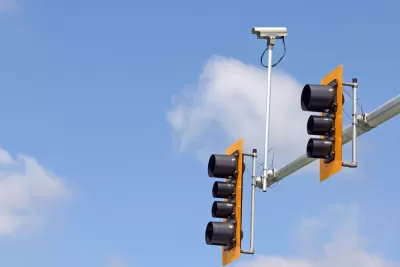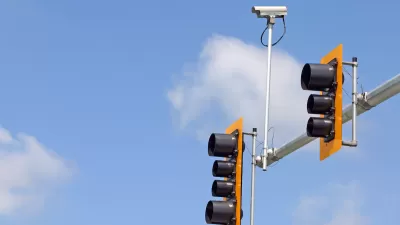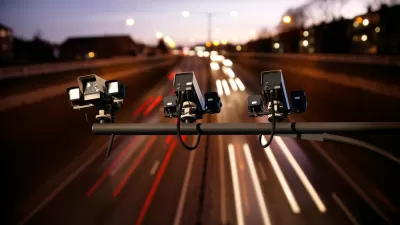Although controversial in the United States, when deployed thoughtfully, automated enforcement can save lives and make roads safer for all users.

A new study assesses attitudes toward automated traffic enforcement and makes recommendations for using traffic cameras to make streets safer and more equitable. As Kea Wilson explains in Streetsblog, the researchers looked at how people perceive traffic cameras and how messaging can alter their views.
In the study, 60 percent of respondents believed that automated enforcement is “mostly about raising revenue,” reinforcing the belief that traffic cameras serve as a cash grab for cities. Yet “Despite evidence that traffic enforcement in general is being used to line city coffers, automated enforcement specifically isn’t a very good cash cow — because local motorists quickly warn each other of the location of new stationary cameras and drive more carefully when they’re nearby.”
This leads to the first recommendation: using good messaging to clarify the role of traffic cameras and debunk myths. Other recommendations include careful camera placement that doesn’t feel like a ‘gotcha,’ but rather uses data to place cameras in areas known to be unsafe; setting appropriate fines to ensure the program doesn’t perpetuate inequity; and spending the revenue on “self-enforcing streets,” which the authors define as infrastructure that makes it difficult to speed, for example.
On how not to spend speed camera revenue, the authors point to “extractive contracts with private firms that take home a hefty percentage of fines and sometimes a bonus per violation, creating an incentive to keep the dangerous drivers rolling in a way that charging cities a flat fee doesn’t.”
FULL STORY: Four Ways To Build A Better Automated Enforcement Program

Planetizen Federal Action Tracker
A weekly monitor of how Trump’s orders and actions are impacting planners and planning in America.

Maui's Vacation Rental Debate Turns Ugly
Verbal attacks, misinformation campaigns and fistfights plague a high-stakes debate to convert thousands of vacation rentals into long-term housing.

San Francisco Suspends Traffic Calming Amidst Record Deaths
Citing “a challenging fiscal landscape,” the city will cease the program on the heels of 42 traffic deaths, including 24 pedestrians.

Defunct Pittsburgh Power Plant to Become Residential Tower
A decommissioned steam heat plant will be redeveloped into almost 100 affordable housing units.

Trump Prompts Restructuring of Transportation Research Board in “Unprecedented Overreach”
The TRB has eliminated more than half of its committees including those focused on climate, equity, and cities.

Amtrak Rolls Out New Orleans to Alabama “Mardi Gras” Train
The new service will operate morning and evening departures between Mobile and New Orleans.
Urban Design for Planners 1: Software Tools
This six-course series explores essential urban design concepts using open source software and equips planners with the tools they need to participate fully in the urban design process.
Planning for Universal Design
Learn the tools for implementing Universal Design in planning regulations.
Heyer Gruel & Associates PA
JM Goldson LLC
Custer County Colorado
City of Camden Redevelopment Agency
City of Astoria
Transportation Research & Education Center (TREC) at Portland State University
Jefferson Parish Government
Camden Redevelopment Agency
City of Claremont





























